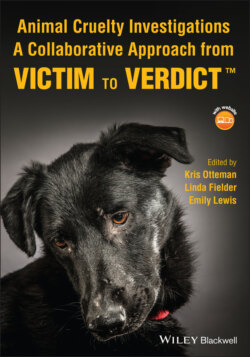Читать книгу Animal Cruelty Investigations - Группа авторов - Страница 134
3.5 Nutrition
ОглавлениеAs pets grow or age, recover from illness, or nurse litters of offspring, their nutritional needs change with their conditions. The first response to these cases should include educating the owner about the nutritional requirements of animals and enacting a plan for bringing the conditions up to muster, if the owner's resources and the animal's conditions allow.
While we know food is important, even vital to sustaining life, nutrition is the combination of carbohydrates, fats, fiber, minerals, proteins, and vitamins that support growth, reproduction, maintenance, and performance. The vast science of animal nutrition revolves around the livestock industry and food production where exact standards are set that will provide optimal and predictable weight gain and finishing. Although food animal nutrition is based on food production science, much information is available about the nutritional needs of all species of animals kept as pets and in zoos as well [1].
Diet and nutrition support every basic function of the body. Today there are commercially prepared diets available for most of the animals we keep as pets, from fish and rabbits to dogs and cats. Manufactured pet and livestock food is regulated by the US Food and Drug Administration (FDA) and the Association of American Feed Control Officials (AAFCO) [2].
Especially within the pet fancier's community, there is much debate about what makes an “adequate” or “high‐quality” diet, and opinions differ wildly about the best options available to owners. For the purpose of evaluating nutrition in the field, the following observations can be helpful when assessing nutritional status:
Is the type and quantity appropriate for the species and size/age of the animal?
Is food being offered at the appropriate frequency?
Is it fresh and stored properly?
Are there factors related to nutrition that need special attention (allergies, illness, age, etc.?)
Is the animal interested in eating the food and is their body condition appropriate?
Just like human infants, juvenile animals require more frequent feedings and a more nutrient‐dense diet. Their mothers also need additional calories to support nursing and recovery (Figure 3.4). Geriatric animals or those recovering from injury or illness may need a special diet they can both tolerate and that will support their healing. They may benefit from accommodations as to how they are fed, or may need to be separated from other animals while feeding. Again, by educating the owner and monitoring compliance and progress, many of these cases can be resolved satisfactorily without the need to issue criminal citations.
Figure 3.4 Animals require additional feed and calories when pregnant or nursing offspring.
Source: Oregon Humane Society.
